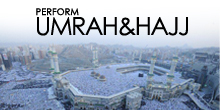Bukhari Hadith – Be in this world as if you are a stranger
Posted in Daily Islam
Ibn Umar (رضي الله عنه) reports the Messenger of Allah (ﷺ) placed his hand on his shoulder and said:
كُنْ فِي الدُّنْيَا كَأَنَّكَ غَرِيبٌ، أَوْ عَابِرُ سَبِيلٍ
“Be in the world as if you are a stranger or a wayfarer.”
[Sahih Bukhari, Volume 8, Book 76, Number 425]
Thereafter, Ibn Umar used to say: “When the night comes, do not wait for the day, and when the day comes, do not wait for the night. Take from your health for your sickness, and take from your life for your death.”
The meaning of “stranger” in this hadîth is that of a person living as a foreigner in a foreign land. Here, Prophet Muhammad (ﷺ ) likens the proper state of a pious believer to a foreigner who has no home to repair to and whose whole life is spent on the road, never staying in any place for a long time, a stranger who is just passing through.
The hadîth says that the believer in the world is like a traveler in a foreign country This simile is rich in meaning. There are at least three ways in which it can be understood
About this hadîth, Ibn Battâl observes:
“A foreigner does not much enjoy the company of other people. He generally feels alienated from them, since he rarely happens upon a person he knows. He is a person in a weak position who needs to remain wary. The same goes for a wayfarer. Allah’s Messenger compared the believers to them to show their asceticism, taking from the world only their basic needs.”
[Ibn Hajar al-Asqalânî, Fath al-Bârî (11/234)]
Ibn Battâl touches upon one of the meanings that is communicated by this hadîth in its comparing a believer to a stranger in a foreign land. This is the lower than normal desire such a person has for socializing with others in the locality and the discomfort that person feels in their company.
There is, though, another meaning expressed by this simile. A stranger who is determined to return to his own country rarely becomes attached to anything in the foreign country where he or she is staying. That person’s heart is too fully attached to his or her homeland.
The same can be said for a believer whose heart does not become attached to anything in the world and who longs for the Hereafter which is the permanent abode and to which is the final return.
We can find a third meaning as well. A stranger is not tainted by the bad conduct that comes from mixing with people and socializing with them. Likewise, a true believer is not distracted from the Creator. Such a person rarely harbors in his heart any envy, rancor, or hypocrisy. A true believer is not one to dispute with others, nor slander them nor expose their faults.
The hadîth also depicts the idea of spiritual advancement and progress. It follows the simile of a stranger with mention of a wayfarer, and a wayfarer is even less attached to the lands that he or she passes through than the stranger or foreign resident.
The way that strangeness is used in this particular hadith is a tangible one; it is the idea of being separated from one’s nation and people and dwelling among others. It does not depict the idea that the believer is regarded as odd or strange by others.
That is another meaning of “stranger” where a person is regarded by the majority to be strange or odd on account of his or her righteousness, adherence to what is best, and avoidance of sin. This is the idea of being in either partial or total nonconformity with one’s surroundings, of doing one thing while everyone else is doing another. They are worlds apart. This other understanding of strangeness describes the believers at the end of time and is the meaning of the estrangement found in the hadîth:
“Islam began strange, and it will become strange again just like it was at the beginning, so blessed are the strangers.”
[Sahîh Muslim (1/131)]










